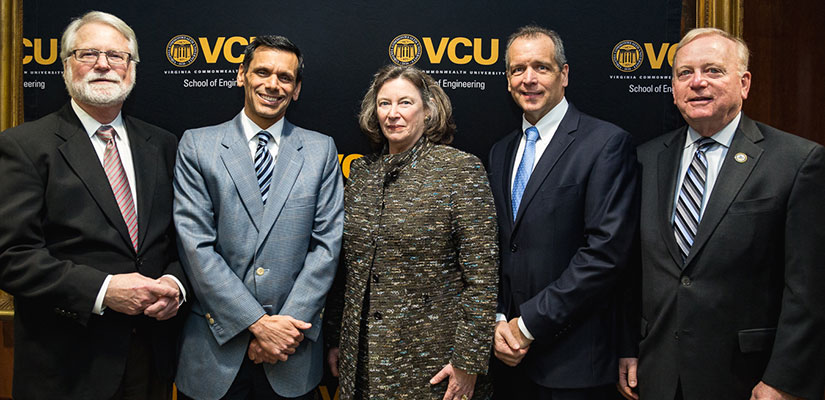Pictured above left to right: L. Franklin Bost (VCU Engineering), Michael Rao Ph.D. (VCU), Barbara D. Boyan, Ph.D. (VCU Engineering), Mark Cruise (Altria Client Services), Mickey Dowdy (VCU Engineering)
Maker Culture and the VCU School of Engineering
Experiential learning is a core attribute of engineering education and preparation for careers in research and industry. Enhancing the maker culture among engineering students and associated university programs supports the school’s goal to nurture quality thinking and spark innovation. The maker culture initiative represents VCU Engineering’s commitment to opportunities to “Make it Real” and facilitate student participation in the steps of ideation, creativity, design, prototyping, testing, transition into manufacturing and deployment into the market. The school supports a culture that translates course knowledge and personal drive into creative new ideas, approaches and solutions.
Creative culture currently exists in engineering and other areas across VCU’s campuses. Altria’s generous support enables engineering to expand inclusiveness and opportunities for culture development. “Maker culture is not about a physical location,” said L. Franklin Bost, who is principal investigator on the IMF strategy, executive associate dean of innovation and outreach in the VCU School of Engineering and director of the VCU Institute for Engineering and Medicine. “Adding this support expands the reach of assets currently available in School of Engineering maker facilities including the West Hall Innovation Shop, MNE Innovation Lab for 3D printing, ECE Electronics Garage, and the C. Kenneth and Dianne Wright Virginia Microelectronics Center,” Bost said. “Our many faculty research labs also participate in the engineering maker culture of discovery and creation.”
A new Innovation Maker Facility (IMF) will enhance innovation in engineering and with affiliated programs. Altria, a major supporter and employer of graduates from VCU Engineering, Business, and other disciplines, recently donated $1 million to the School of Engineering to enhance student creativity and maker culture.
The expansive facility will be in a new VCU Engineering Research Building and will provide new tools and methodologies that advance the school’s longstanding culture of hands-on approaches to engineering, design and development. The roughly 9,000-square-foot IMF will support collaborative projects involving students from engineering, business, and the da Vinci Center. “Make it Real” capabilities in the IMF will include hand tools, tabletop equipment, industrial grade manual and CNC machines, laser cutters, bench electrical fabrication, 3D printing and other equipment. The IMF’s offerings will supplement equipment currently available in the West Hall Innovation Shop, which will be relocated when the new facility opens in 2020. Additional equipment will be added based on new required capabilities and participation by supporters.
Communal makerspaces are central to the popular maker movement, which is often in the news and has risen in prominence in both academic and community facilities. The idea is rooted in creativity and engineering fundamentals, according to L. Franklin Bost, M.B.A., director of VCU’s Institute for Engineering and Medicine and executive associate dean for innovation and outreach. "Maker culture grew out of mechanical and industrial design movements, which launched the Industrial Revolution.” Bost, an experienced product developer and biotechnology entrepreneur, said, “Every industry company I have worked for has had makerspaces to support the development of new products and product improvements. For engineering this really promotes economic development.”
Bost is no stranger to creating innovative learning laboratories. Before his VCU appointment, he oversaw the engineering design courses and studios/labs in the Department of Biomedical Engineering at Georgia Tech. While there, he converted a neglected shop into a biomedical engineering makerspace that served more than 1,700 students. Bost has seen students acquire new skills outside the classroom and traditional labs through experiences that foster innovation and the multidisciplinary collaborations required to advance a new concept or design. He observed that many students enter engineering with little prior hands-on “making” experience, although many had access in middle and high school to technology-based prototyping. Bost said that “we want to empower all our interested students to participate in ideation and creation with hands-on learning experiences.”
This enhancement of VCU Engineering’s maker culture signals a grassroots approach to curriculum enrichment. The IMF is founded on the idea that involved students are fundamental to its successful operation. A student Makers Club will assist the facility director and shop managers in providing user training and supervisory assistance in keeping with maker culture’s focus on active learning within a social environment. The IMF is not wedded to specific courses or departments but available to trained undergraduate and graduate students as well as faculty inventors. Altria’s support is immediately useful in expanding the breadth and depth of the School of Engineering’s maker culture while the new Engineering Research Building and IMF facility are in the final design and construction stages along its Cary Street location.
